Install Moodle Ubuntu
Moodle is an open-source and free learning management system distributed upon the GNA General Public License and written in PHP. It is used for the flipped classroom, distance education, blended learning, and other online learning programs in workplaces, universities, schools, and other sectors. Also, it is used to establish custom websites with many online courses and permits for community-sourced plugins.
Overview to Moodle
Originally, Moodle was created by Martin Dougiamas with the aim of helping educators make online courses and a concentration on collaborative and interactive content construction. The first Moodle version was published on 20 August 2002, and it actively continues to be developed.
Moodle is a training platform used to move and augment existing learning platforms online. Moodle developed several features considered standard to learning management systems, like a gradebook and calendar as an E-learning tool. This project is coordinated and led by an American company Moodle HQ, which is supported by an eighty-four mobile partner service companies network worldwide. Also, the development is assisted by an open-source community.
Moodle mobile applications, mobile responsive web design, custom graphical themes, and plugins are available to customize all individual experiences in the environment. The mobile application of Moodle is available on Windows Phone Store, F-Droid, App Store (iOS), and Google Play.
Support of E-Learning standards
Moodle has accepted the below e-learning standards:
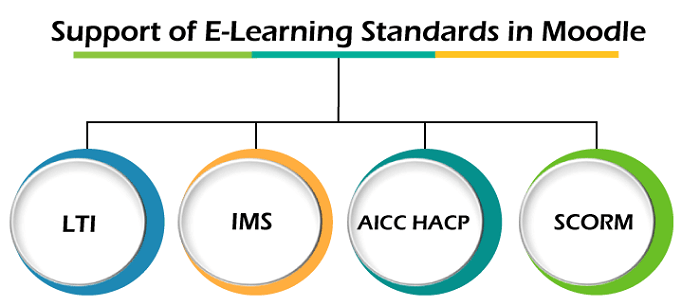
- LTI (Learning Tools Interoperability): It is a standard way of developing rich learning apps (provided by third-party services and often hosted remotely) using education platforms. The model utilizes the External Tool activity to operate as a standard as an "LTI consumer" and will operate as an "LTI provider" with a plugin.
- IMS: Also, Common Cartridge packages can be imported into Moodle. Moodle Book activities can also be shipped as IMS Content Packages.
- AICC HACP: For CMI, this standard was created by the AICC (Aviation Industry Computer-Based Training Committee) and is used to externally call authored assessment and content packages. They are supported in the 2.1 and later versions of Moodle.
- SCORM: Sharable Content Object Reference Model is a group of E-learning specifications and standards that describe communications between a server-side learning management system and client-side content and how authored content externally should be packaged to efficiently develop with the LMS. There are two editions: SCORM 2004 and SCORM 1.2. Moodle SCORM 1.2 is compliant and passes every test in the 1.2.7 version of the ADL Conformance test suite for SCORM 1.2. SCORM 2004 isn't supported in Moodle, but Rustici Software contains a Moodle plugin that can change any mobile site into a completely compliant SCORM 2004 LMS.
Development of Moodle
Users can get Moodle on any web server, like Apache HTTP server, and several database management systems, like MySQL, are supported. Pre-built Moodle combinations with a database and Web server are available for Macintosh and Microsoft Windows.
Other automated installation methods exist, like installing any Debian package, using the Bitnami installer, setting up a ready-to-use TurnKey Moodle appliance, or using a "one-click install" aspect like Installatron.
Verified Moodle partners offer other services of Moodle, including content development, customization, training, and hosting. This provider network supports Moodle project development by royalties.
Interoperability of Moodle
Moodle executes without modification on NetWare, macOS, Windows, FreeBSD, Linux, UNIX, and any other system that supports a database and PHP, including webhost providers.
Also, Moodle has imported aspects for use with other particular systems, like importing entire or quizzes courses from WebCT or Blackboard. Moodle didn't import Blackboard courses because of the modifications in the PHP code releases as of February 2010.
Blackboard inherited two companies based on the software of Moodle, including NetSpot of Adelaide, Australia, and Baltimore-based Moodlerooms Inc. in March 2012. Blackboard inherited Colombia-based Nivel7, the biggest Moodle service provider, in August 2015. Opensource.com, the Red Hat site, said that Moodle will always be a free project with a fair delineation between Moodle and Blackboard.
Background of Moodle
- Origins
Martin Dougiamas, with graduate degrees in education and computer science, wrote the first Moodle version. Dougiamas began a Ph.D. to consider "the open-source software use for supporting a social constructionist epistemology of teaching in learning in Internet-based reflective inquiry communities". However, how social constructivism enables Moodle to be different from several e-learning platforms is hard to display; it has been specified as an important feature by Moodle adopters. Many Moodle adopters, like UK Open University, have said that Learning Management Systems can be seen equally as "relatively pedogogy-neutral".
- Name origin
Officially, the Moodle acronym means modular object-oriented dynamic learning environment. The "m" means "Martin's", after the actual Martin Dougiamas developer when the project was initially started. Also, the name was selected due to the Moodle dictionary definition with connotations, like "creativity", "inside", and "tinkering", as well as for corresponding to a domain name besides being an acronym.
- Pedagogical approach
The Moodle philosophy includes a social and constructivist constructionist approach to education, focusing not only on teachers but learners because they can contribute to the academic experience. Moodle offers an environment to learn communities using pedagogical principles.
Development of Moodle
Moodle has continued to derive since 1999. It has been converted into 100+ different languages and is usable in several countries across the world. Institutions can merge as various Moodle servers as required without needing to pay license fees. The UK Open University applies a Moodle installation for their 2 lakh users currently. While the UK Government applies a Moodle installation for the Civil Service Learning environment serving half a million customers.
Moodle Benefits
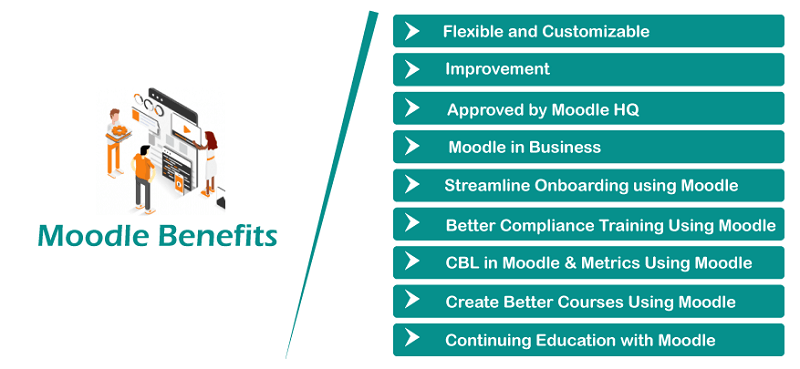
- Flexible and Customizable
Moodle is freely available to download. The code of Moodle is open source, which defines that everyone using it can re-distribute, modify, change, and review it if they wish. While a few site owners of Moodle select to completely support Moodle on their own, others outsource particular operations to Moodle Hosting Service Providers due to being more cost-effective.
Exactly Moodle can have the features and functionalities that we wish, as well as the flexibility to accept as things modify the future with almost endless customization options. It can be a time-consuming and complex task to reach the complete potential open-source nature of Moodle all by ourselves.
It is not only more cost-effective to utilize to a Moodle Hosting Service Provider. It also defines we will be getting expert help from Moodle for a cost fraction of doing so. Following is a service list that Moodle Hosting Service Providers offer typically:
- Moodle Themes (consolidate our color scheme and logo)
- Moodle Plugins Installation
- Moodle Integrations
- Moodle Implementation and Set-up
- Moodle Managed Could Hosting
- Actual Insight of Our Teachers, Courses, and Learners
Learning management systems, such as Totara Learn and Moodle, produce a lot of data but generally have limited analytics and reporting capabilities. Moodle enables only the capability to produce standard reports for some data subsets, but not each of them. Several companies select to increase their stock abilities by accepting a tool like Lambda Analytics to get access to learning data in their learning management system.
- With Lambda Analytics (also known as Zoola or Zoola Analytics), it's possible to:
- Schedule, embed, and share insights with everyone in our organization
- Work from 30+ pre-configured dashboards, reports, and views linked to our learning management system
- Bring our reports and views together into filtered and stunning dashboards
- Establish compelling visualizations, such as cross-tabs, charts, and tables
- Improvement
Being open source, Moodle is a joint effort and is supported by a robust global community. A great advantage of being open source is that the code is free for scrutiny. It means that developers can use the code from everywhere and change it to continually extend the software.
Also, it means that the code is marked by real Moodle users. The advantage of it is that Moodle is regularly updated by users who understand what they require for a better user experience.
The final advantage of using a learning management system is that it's driven by the biggest open-source teams across the world. We have the ability to link with other users of Moodle and find answers to our questions within the Community Forums of Moodle. Chances are high that our Moodle question will never be unanswered with only under 300 million posts and 72+ million Moodle learning resources.
- Approved by Moodle HQ
The open-source project of Moodle is handled at Moodle HQ by a dedicated team with a head office in Australia, Perth, and satellite offices worldwide. Moodle HQ is composed of a different group from all over the world with different opinions and backgrounds who are committed to operating on new aspects and keeping Moodle upgraded.
The Moodle HQ team is composed of 50+ team members in 10 countries who can speak 20 languages. MoodleMoot conferences are organized worldwide with a concentration on encouraging sharing and collaboration best forms of the open-source learning environment. MoodleMoots are visited by keen Moodle members and presenters of the Moodle community, the users of Moodle worldwide, Moodle sponsors, and partners.
- Moodle Will Do the Same as What We Require
Moodle has been widely adopted because it is feature-rich, highly flexible, and configurable. On top of being able to change the open-source code of Moodle, there are 1000+ Moodle plugins that let Moodle be set up so that it is exactly the same way we like.
With 1000+ Moodle plugins integrated by the global community, administrators, managers, and learners have the opportunity to twist a platform that makes learning fun, engaging, and collaborative.
- Moodle in Business
Many didn't expect the popularity Moodle would gain in the business world when it was published in 2002 for higher education and K-12 institutions. It was developed to help users learn in collaborative and private environments online, and enterprises quickly came around the world to know the business usage of Moodle.
Moodle has been utilized in several organizations to gain impressive business results since its conception. There are endless examples, but we will discuss some of them as follows:
- Streamline Onboarding using Moodle
Moodle is utilized by several enterprises to onboard fresh hires. If we had worked for any small-medium-sized enterprise, our onboarding process might have been paper-heavy and procedural. The onboarding process can be up-to-date for administrators and used to engage and welcome new hires with Moodle.
Particularly, HR managers like the ability to offer onboarding in Moodle by course modules because results can be analyzed and tabulated. Varying courses can additionally be cloned so that changes can be made for distinct departments.
- Better Compliance Training Using Moodle
Compliance trainers like the online training abilities of Moodle because they can prove who has completed compliance training successfully, the same as why HR managers like onboarding with Moodle. Moodle Badges plugin permits us to award our people on successful compliance training completion.
- Establish a Safer Workplace Using Moodle
In Moodle, Workplace Safety Training permits us to know who has finished the necessary training and who hasn't, the same as the compliance training. With the ability to discuss quizzes and questions and add videos and external resources to our online Moodle courses, this training can be finished at a location and time convenient for the learner.
- CBL in Moodle & Metrics Using Moodle
During the development of Competency-Based Learning using the Moodle Competency Module, all training managers are armed with a process to define competencies connected to an evaluation scale like a series of letters and numbers used to decide the level of understanding of the learner of the defined competency. Also, it could be something like fully competent, competent with supervision, or not competent.
Competencies evaluate a statement series which can be given at the completion of a course with the total grade or the activity level, unlike grades, composed of projects, attendance, participation points, and test scores.
- Create Better Courses Using Moodle
Moodle contains several tools to create engaging, interactive, and dynamic online courses. Learners have several tools to learn on time and in real-time, with many modules for both asynchronous and synchronous learning activities. We can build e-Learning programs using several strategies, including blended learning, non-self-paced learning, and self-paced learning using Moodle course builder tools.
- Leverage Our COE and COP Using Moodle
COP (Communities of Practice) and COE (Communities of Expertise) are informal people groups in the business community that have basic interests and goals and operate together to learn and guide each other. Commonly, Moodle is used in enterprises to help their employees communicate with experts in several subject areas. In these COPs and COEs, users can search discussion forums or ask questions to understand the knowledge they are searching for.
- Product and Service Launches Using Moodle
In the business world of today, services and products are being updated, changed, or modified at an ever in enhancing rate, so it's important to know that product knowledge training isn't a one-time event. Instead, product knowledge is a continuous education initiative that modifies as new features and new clients emerge.
Moodle makes it convenient to train our people across every department and even offers "just -in-time" access to the product knowledge essential for their functional teams.
- Partner, Channel, and Client Training Using Moodle
One of the best things about Moodle is that it's easy for users to establish their accounts to use the courses we wish to make available. It makes it convenient to train channel partners, clients, and business partners at a good price.
- Continuing Education with Moodle
As we know that Moodle was developed for higher education, and several organizations utilize Moodle to give their staff continuous education opportunities to aid them further their careers. They have seen several of their clients give leadership training, high school courses, and management training to tradespeople searching for upgrade courses.
Moodle Benefits for Education
Originally, Moodle was integrated with higher education platforms in mind. However, it has quickly broadened to encompass a whole variety of educational institutions. It has become a supportive and intuitive environment for all education system levels. Moodle can be utilized by administrators operating in the K-12 system, private schools, and higher education. Every feature highlighted is applicable to every level, which is mentioned below:
Moodle in K-12
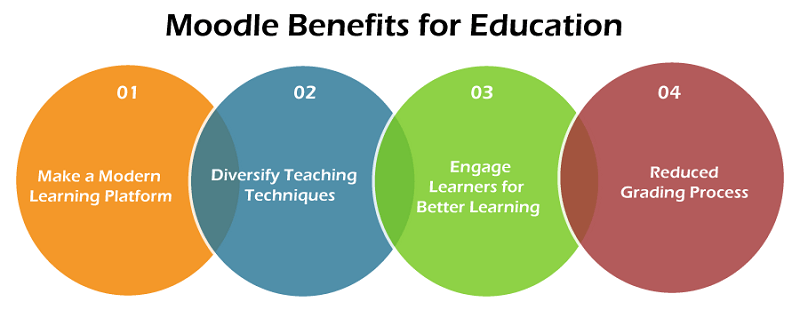
- Make a Modern Learning Platform
The old classroom is combined with the online world, and learners need to understand how to work in this combined learning platform. Moodle is an entry point for young learners to start communicating online and permits them to become convenient on the internet. Moodle guides them to common computer skills, like dealing with online files and videos, working with PDFs, sending emails, and typing because learners take e-Learning courses.
- Diversify Teaching Techniques
Multimedia components can be added to courses, like audio, video, and slideshows in Moodle. These different components keep learner minds engaged and stimulated by giving various techniques of teaching similar to the gamification technique.
- Engage Learners for Better Learning
It is a big task for teachers to keep students interested and engaged, especially at the secondary and primary levels. Moodle can incorporate games into several learning courses (it is also called gamification). In nature, these games are informational, and they aid keep young students encouraged and engaged to participate.
- Reduced Grading Process
Test and assignment grading can be finished in Moodle by the Gradebook plugin. A few ways are available that we can utilize Moodle for education.
Moodle in Higher Education
- Accessible and Open Communications
A steady communication stream is necessary for higher education for success, and Moodle can open this channel. Many communication facilities are available in Moodle, such as blog posts, comments, chat, messaging, and forums for teachers and students to be able to negotiate from behind the classroom, permitting learning to go behind the school days. The best thing about Moodle is that we can use it any time of the night or day, so we can log on when we have time for communication.
- Convenient Collaboration
Moodle implements and encourages teamwork and collaboration. In Moodle, the communication aspects mentioned above (messaging, forums, discussions) permit learners to work together, ask questions, and share ideas if required.
- Multimedia Syllabus Formation
Supplementary resources and course materials are just as necessary as in-class lectures in higher education. In Moodle, we can upload and distribute pictures, videos, articles, sources, and other things students may require to complete their assignments and coursework.
- 24/7 Assignment Submission
>Assignment submissions aren't only restricted to school hours; they can be submitted at any targeted time, such as evenings, early mornings, and weekends in Moodle.
- Tablet and Mobile Phone Compatibility
Moodle was designed to learn on the go. Moodle Mobile is responsive, design-based, and compatible across several devices, including laptops, tablets, and smartphones. The content of Moodle course can be used from home while on a coffee break, at work, on the bus, or from everywhere we have internet access. Also, it's possible to link with course participants, track our progress, inspect upcoming deadlines, and submit assignments.
How to Install Moodle on Ubuntu?
- We need to install PHP libraries and extensions needed by Moodle with the help of the APT package manager:
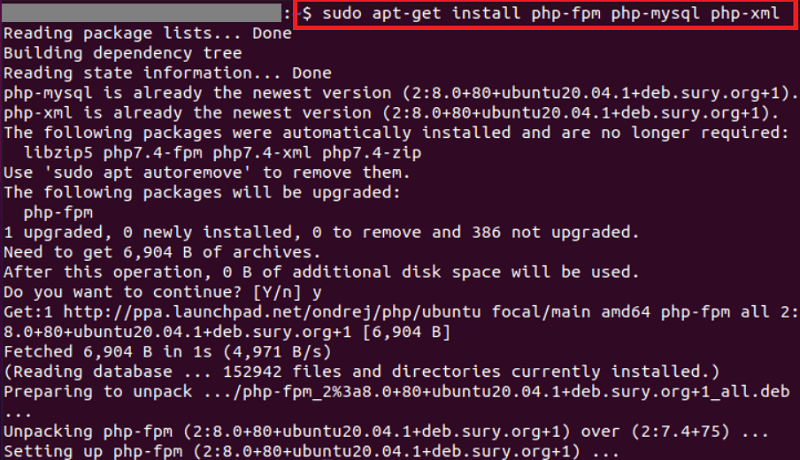
- We need to establish a database for our Moodle system. To do so, log in to the database administration shell of MySQL and establish the database.
- We will run the following command in the terminal window to download Moodle on Ubuntu:
https://download.moodle.org/download.php/direct/stable310/moodle-3.10.1.tgz
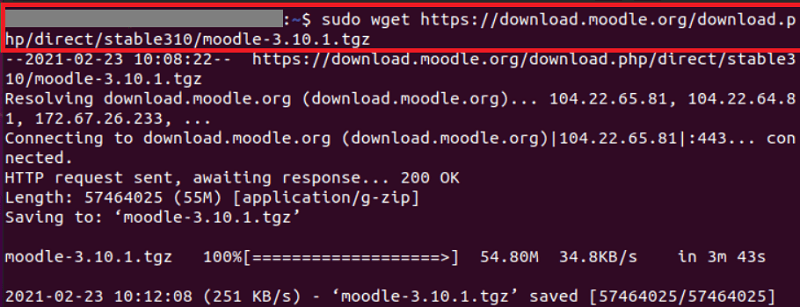
|





 For Videos Join Our Youtube Channel: Join Now
For Videos Join Our Youtube Channel: Join Now










